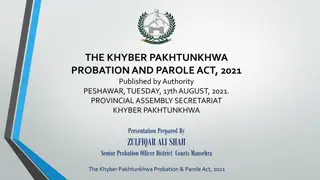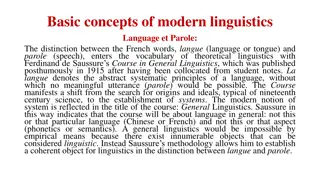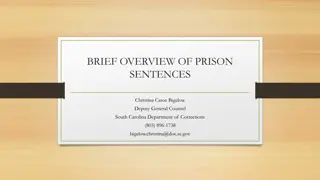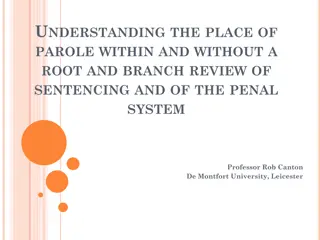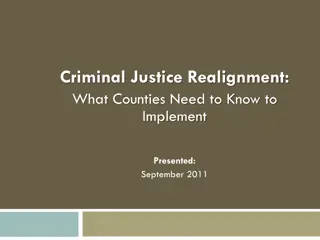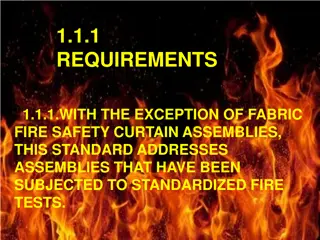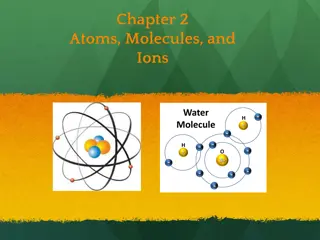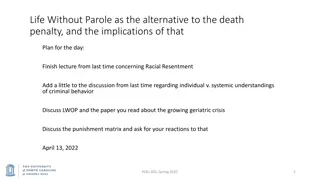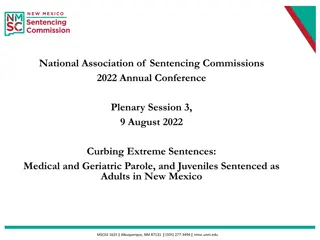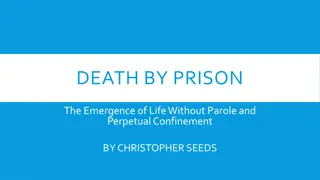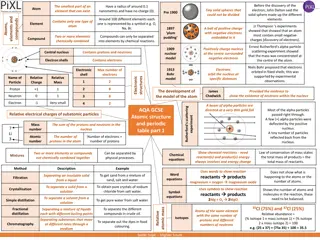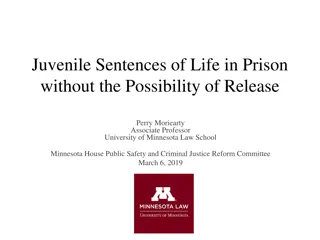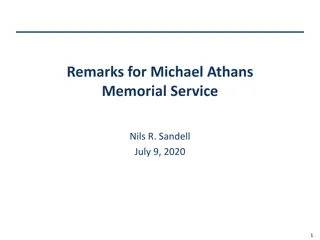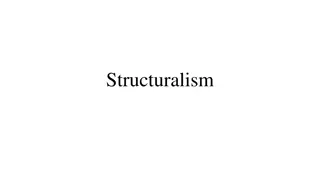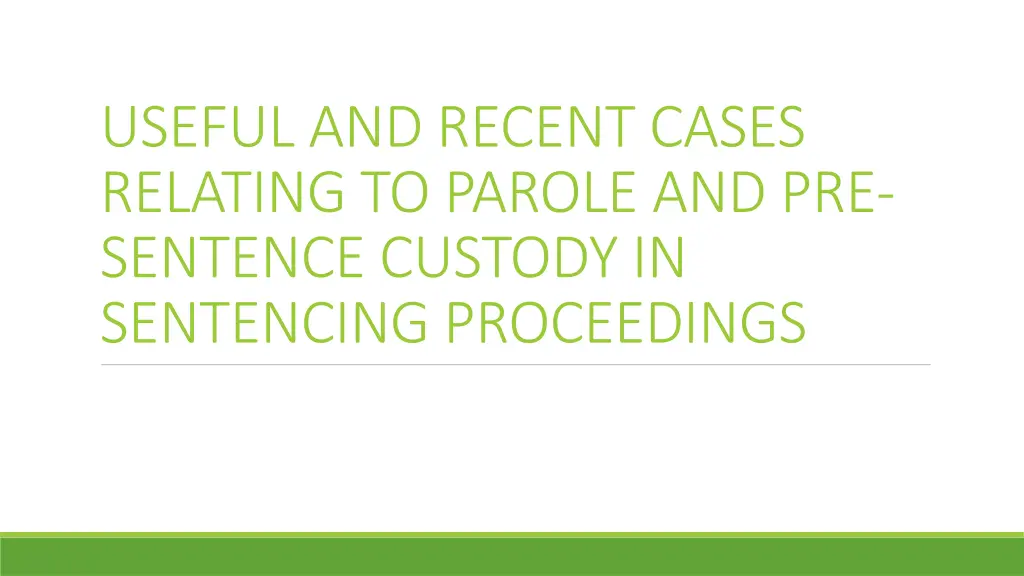
Recent Cases and Guidelines on Parole and Pre-sentence Custody
Explore useful information and recent cases regarding parole and pre-sentence custody in sentencing proceedings under the Penalties and Sentences Act 1992. Understand the definitions, application of laws, and considerations for parole eligibility in different sentencing scenarios.
Download Presentation

Please find below an Image/Link to download the presentation.
The content on the website is provided AS IS for your information and personal use only. It may not be sold, licensed, or shared on other websites without obtaining consent from the author. If you encounter any issues during the download, it is possible that the publisher has removed the file from their server.
You are allowed to download the files provided on this website for personal or commercial use, subject to the condition that they are used lawfully. All files are the property of their respective owners.
The content on the website is provided AS IS for your information and personal use only. It may not be sold, licensed, or shared on other websites without obtaining consent from the author.
E N D
Presentation Transcript
USEFUL AND RECENT CASES RELATING TO PAROLE AND PRE- SENTENCE CUSTODY IN SENTENCING PROCEEDINGS
Penalties and Sentences Act 1992 Section 4 Definitions Period of Imprisonment means the unbroken duration of imprisonment that an offender is to serve for 2 or more terms of imprisonment, whether (a) Ordered to be served concurrently or cumulatively; or (b) Imposed at the same time or different times; And includes a term of imprisonment Section 160 Definitions for Div 3 Period of Imprisonment means the period of imprisonment that includes the term of imprisonment mentioned in section 160A Note Period of imprisonment therefore includes the term of imprisonment a court is imposing at the time of sentence.
Penalties and Sentences Act 1992 Section 160A Application of ss160B 160D (1) Section 160B to 160D apply if a court is imposing a term of imprisonment on an offender for an offence (2) Sections 160B to 160D are the only law under which a court may, on sentence of an offender for an offence, make an order relating to a person s release on parole. (3) (4) (5) (6) Sections 160B to 160D do not apply if a court sentences an offender to a term of imprisonment and makes any of the following orders under this Act for the offender a. an intensive correction order; b. a probation order mentioned in section 92(1)(b); c. an order that the whole or a part of the term of imprisonment be suspended.
Penalties and Sentences Act 1992 Section 160B Sentence of 3 years or less and not a serious violent offence or sexual offence (1) This section applies if neither section 160C nor 160D applies. (2) If the offender has had a court ordered parole order cancelled under the Corrective Services Act 2006, section 205 or 209 during the offender s period of imprisonment, the court must fix the date the offender is eligible for parole. (3) If subsection (2) does not apply, the court must fix a date for the offender to be released on parole. (4) (5) (6)If the offender had a current parole eligibility date or current parole release date, a date fixed under subsection (2), (3) or (4) must not be earlier than the current parole eligibility date or current parole release date. (7) . (8) (9)
Penalties and Sentences Act 1992 Section 160C Sentence of 3more than 3 years and not a serious violent offence or sexual offence (1) This section applies if section 160D does not apply and the offender s period of imprisonment is more than 3 years. (2) If the offender had a current parole eligibility date, the court must dix the date the offender is eligible for parole. (3) If the offender had a current parole release date, the court may fix the date the offender is eligible for parole. (4) A date fixed under subsection (2) or (3) must not be earlier than the current parole eligibility date or current parole release date mentioned in the subsection for the offender. (5) If neither subsection (2) nor (3) applies, the court may fix the date the offender is eligible for parole.
Penalties and Sentences Act 1992 Section 160F Significance of an offender s period of imprisonment (1) One of the objects of sections 160A to 160E is to ensure that at any 1 time there is only 1 parole release date or parole eligibility date in existence for an offender. (2) When fixing a date under this division as the date an offender is to be released on parole or is to be eligible for release on parole, the date fixed by the court must be a date relating to the offender s period of imprisonment as opposed to a particular term of imprisonment. Examples O is sentenced to a term of 1 year s imprisonment on 1 July 2007 with a parole release date of 1 January 2008. O is released on parole on 1 January 2008. On 1 April 2008, O is sentenced to a further term of 1 year s imprisonment for another offence. A parole eligibility date fixed for O under section 160B(2) must relate to the 2 years period of imprisonment to which O has been sentenced and must not be earlier than 1 January 2008. O is sentenced to a term of 1 year s imprisonment on 1 July 2007 with a parole release date of 1 January 2008. On 1 November 2007, O is sentenced to a further term of 1 year s imprisonment for another offence, to be served concurrently with the first term. A parole release date fixed for O under section 160B(3) must relate to the 16 months period of imprisonment to which O has been sentenced and must not be earlier than 1 January 2008. (1) (2)
Corrective Services Act 2006 Schedule 4 - Definitions Parole order (a) Means a parole order mentioned in section 194 or a court ordered parole order; and (b) For chapter 5, part 1, division 1, subdivision 2 see section 178; and (c) For chapter 5, part 1, division 2 see section 186 Note Under the youth Justice Act 1992, section 276E and 276F the provisions of this Act that apply to a parole order also apply to a statutory parole order under those sections of that Act.
Corrective Services Act 2006 Section 205 Amendment, suspension or cancellation (1) (2) The parole board may, by written order amend, suspend or cancel a parole order if the board reasonably believes the prisoner subject to the parole order i. has failed to comply with the parole order; or ii. poses a serious risk of harm to someone else; or iii. poses an unacceptable risk of committing an offence; or iv. is preparing to leave Queensland, other than under a written order granting the prisoner leave to travel interstate or overseas; or amend, suspend or cancel a parole order, other than a court ordered parole order, if the board receives information that, had it been received before the parole order was made, would have resulted in the board making a different parole order or not making a parole order; or amend or suspend a parole order if the prisoner subject to the parole order is charged with committing an offence; or suspend or cancel a parole order if the board reasonably believes the prisoner subject to the parole order poses a risk of carrying out a terrorist act. a. b. c. d. (3) (4) (5) A written order amending, suspending or cancelling a parole order has effect from when it is made by the parole board. (6)
Corrective Services Act 2006 Section S209 Automatic cancellation of order by further imprisonment (1) If a prisoner is sentenced to another period of imprisonment for an offence committed, in Queensland or elsewhere, during the period of the prisoner s parole order, the order is taken to have been automatically cancelled on the date on which the offence occurred. (2) Subsection (1) applies whether or not the prisoner is sentenced to the other period of imprisonment before or after the parole order has expired; and subject to section 205. a. b. Note sections 211 and 215 for the effect of the cancellation. (3) However, subsection (1) does not apply if the prisoner is required to serve the period of imprisonment mentioned in the subsection in default of i. paying a fine or another amount required to be paid under a court order; or ii. making restitution required to be made under a court order; or the period of imprisonment mentioned in the subsection i. is required to be served under an intensive correction order; or ii. is wholly suspended under the Penalties and Sentences Act 1992, part 8; or iii. is required to be served until the court rises. a. b.
Corrective Services Act 2006 Section S211 Effect of cancellation (1) This section applies if a prisoner s parole order is cancelled a. under section 205(2)(a)(i) because the prisoner failed to comply with the parole order; or b. under section 205(2)(a)(ii) because the prisoner posed a serious risk of harm to someone else; or c. under section 205(2)(a)(iii) because the prisoner posed an unacceptable risk of committing an offence; or d. under section 205(2)(a)(iv) because the prisoner was preparing to leave Queensland, other than under a written order granting the prisoner leave to travel interstate or overseas; or e. under section 205(2)(b) because the parole board received information that, had it been received before the parole order was made, would have resulted in the parole board making a different parole order or not making the parole order; or f. under section 209 because the prisoner was sentenced to another term of imprisonment for an offence committed, in Queensland or elsewhere, during the period of the parole order. Note For subsection (1)(a), (b), (c) and (d), see also sections 208B(6) and 208C(2). (2) This time for which the prisoner was released on parole before one of the following events happens counts as time served under the prisoner s period of imprisonment a. the prisoner failed to comply with the parole order as mentioned in subsection (1)(a); b. the parole order was cancelled for the reason mentioned in subsection (1)(b), (c), (d) or (e); c. the prisoner committed the offence mentioned in subsection (1)(f). (3) Despite section 206(3)(b), the parole board may, by written order, direct that the prisoner serve only part of the unexpired portion of the prisoner s period of imprisonment.
Corrective Services Act 2006 Section S214 Prisoner released on parole taken to be still serving sentence A prisoner released on parole is taken to be still serving the sentence imposed on the prisoner Section S215 Expiry of parole order A prisoner is taken to have served the prisoner s period of imprisonment if the prisoner s parole order expires without being cancelled under section 205 or 209.
S160B(2) and Period of Imprisonment S160B(2) and Period of Imprisonment
AG (QLD) v Kanaveilomani [2013] QCA 404 The effect of a PSC declaration under the old s159A (prior to May 2020 amendments) was to effectively backdate the sentence for which the declaration was being made. Where an offender is in custody serving a sentence and then remains in custody after the expiry of that sentence, but is later sentenced to a further term of imprisonment with a PSC declaration this has the effect of backdating the new term to the day after the old sentence expired. In those circumstances there was a period of unbroken duration of imprisonment under the two terms (old and new), falling withing the definition of period of imprisonment in s4 PSA. [68]
R v Smith [2015] QCA 397 Time up until the commission of an offence on parole will count as time served under period of imprisonment, but the balance will not. The balance is the unexpired portion of the prisoners period imprisonment for the purposes of s210(3) CSA. [24] Actual time in custody is not the test for whether a prisoner is serving the sentence imposed . Time on parole is still time served as part of the term of imprisonment , and therefore part of the period of imprisonment . [25] Where a prisoner commits an offence during the period of a court ordered parole order, the prisoner becomes subject to a contingent liability as the sentence for that offence will have the result of automatically cancelling the parole order, even if the sentence that brings about that result occurs after the period of the parole order has expired. The balance of the period is the unexpiredportion which must be served when the prisoner is arrested. [30]
R v Bliss [2015] QCA 53 Where an offender has had a court ordered parole order cancelled under s209 CSA during the offenders period of imprisonment , a PED must be fixed under s160B(2). [11] The period of time between the date the offender committed an offence on parole and the cancellation of the offender s parole becomes time that an offender is required to serve in prison. That time became part of the offenders period of imprisonment within the meaning of s160B(2) and the court was required to fix a PED. [14].
Addo v Senior Constable Jacovos [2016] QDC 271 s160B(2) is confined to a court ordered parole order [52]
R v Hall [2018] 3 Qld R 628 When a sentence of imprisonment is pronounced for offending on parole the offender would begin to serve a period of imprisonment consisting of two terms: the term imposed for the new offence committed whilst on parole, and that part of the earlier sentence of imprisonment from the original sentence required to be served as a result of the cancellation of the parole order:[17], [21] [25] In that sense the cancellation happened during the offenders period of imprisonment within the meaning of s160B(2) PSA. That period of imprisonment was an unbroken period of imprisonment including both the term of imprisonment now to be imposed and the term of imprisonment imposed for the original offending: [17] [21] [25] Obiter -insofar as the final paragraphs of the judgement in R v Smith imply that s1650B(2) would not have applied in that case if the sentence had not been backdated , they are incorrect. [21].
R v Winklemann [2022] QDC 49 Offences were committed whilst on court ordered parole, but after the offenders parole order had been suspended, but before he was RTC. Held that even though the offenders parole order had been suspended prior to the commission of the new offences, he was still the subject of a parole order for the purposes of s160B(2). The effect of suspension is to allow for the return to custody for the period of suspension and the non-allowance of any time for which the prisoner remained unlawfully at large after the suspension. The parole order is not rescinded and remains effective to be re-engaged once the period of suspension has been completed. Chevathen v QPS [2016] QDC 270 not followed. [11] [18] Found that the offender had committed offences during the period of his court ordered parole order and that pursuant to s209 CSA that the offenders parole order is taken to have been automatically cancelled on the date which the offence occurred . [29]
R v Winklemann [2022] QDC 49 cont. However, held that for the purposes of the operation of 160B(2) the cancellation under s209 PSA did not occur during the offenders period of imprisonment . The question becomes whether the date of the offence and effective cancellation at that point in time, is within the period of imprisonment for which the court may be required to fix or consider fixing an entitlement to parole pursuant to Division 3 of Part 9 PSA. (This would encompass both s160B and s160C) Found that the definition of period of imprisonment is not just a matter of looking to any continuous period when a prisoner has remained in custody, but requires a nexus or connection of terms of imprisonment imposed by court orders in a concurrent or cumulative sense. When reading s155 (concurrency) and 156 (Cumulation) PSA, the common nexus is in respect of circumstances where an offender is serving, or has been sentenced to serve, imprisonment for an offence . [24]-[27]
R v Winklemann [2022] QDC 49 cont. Whilst there may be an unbroken duration of (actual) imprisonment after a person has completed serving an earlier sentence, because they remain on remand for other offences, this leaves open the prospect of consecutively operative terms or periods of imprisonment. [27] NB this notion of consecutive terms of imprisonment was first raised by Judge Long SC in Rule v Commissioner of Police [2016] QDC 64 at [53]-[54] Found that because of the suspension of parole prior to the commission of the new offences and his subsequent return to custody where he served his full liability under the earlier imposed sentences, that as at the date of sentence there was no contingent liability in respect of any pre-existing period of imprisonment, such as discussed in R v Smith. [10] It is important to note that PSC in respect of the new offences was declared from 03/02/22 after the offender had served out all liability under his previous offences on 02/02/22. Found that each of the offences were committed on the date during a prior period of imprisonment and not the period of imprisonment comprising the terms imposed on and commencing at the date of sentence in respect of which the court was concerned as to fixing any parole entitlement. [29] That the period of imprisonment had been broken because the offender had already served his liability under the previous sentences by the time he was sentenced for the new offending. The court was not dealing with a series of concurrent or cumulative terms of imprisonment which formed a period imprisonment but rather to consecutive periods of imprisonment. The provisions of Div 3 only attached to the period of imprisonment for the offences before the court and any related presentence custody. [31] [44]
R v Winklemann [2022] QDC 49 cont. Some observations There is possible tension between the interpretation of period of imprisonment for the purpose of s160B(2) in this case and in the prior authorities of Smith, Bliss and Hall (above) which all found that the period of time between the date the offender committed an offence on parole and the cancellation of the offender s parole becomes part of the offenders period of imprisonment within the meaning of s160B(2). However, the facts in Winklemann are different to each of those cases because the parole order had been suspended prior to the commission of the offences and as a result the offender had served their contingent liability prior to sentence. As such Winklemann may be confined to the particular factual scenario and the reasoning may be able to be reconciled. The reasoning in Winklemann may also apply to a situation where a person has had their court ordered parole order cancelled (s205 CSA) prior to the commission of new offences. The contingent liability would be able to be calculated being the date of the cancellation to the end of the existing sentence (the unexpiredportion Smith). If that liability has been served by the time the offender is sentenced for new offending then it is arguably a consecutive sentence at that point and s1650B(2) would not apply because there is no cancellation of court ordered parole within the period of imprisonment under consideration for the fixing of a parole date.
R v Winklemann [2022] QDC 49 cont. Some observations cont. Brings into focus the notion there is, on His Honours view, a real difference between a consecutive sentence and sentences which are concurrent or cumulative and have a nexus to a previous term and therefore are to be included in the calculation of a period period of imprisonment . Some room for debate. The notion of a consecutive sentence appears to be directly at odds with the decision in Kanaveilomani. His Honour acknowledges as much in his judgment [39] - [45] but seeks to distinguish this authority on the basis that the particular considerations relating to the definition of period of imprisonment which applied in this case did not appear to be engaged in Kanaveilomani and neither were the consideration as to the contingent liability noted in R v Smith. Perhaps this issue needs to be reargued in light of Smith and Winklemann. Highlights that whilst the provisions of s205 and 209 CSA are interrelated to the operation of s160B(2) there are differences in their effect and operation and for the purpose of fixing a parole period of imprisonment must be considered under the PSA for that purpose.
S160F (2) S160F (2) Fixing a parole date relating to Fixing a parole date relating to a period of imprisonment a period of imprisonment
R v Gillbanks [2015] QCA 148 s160F makes it clear that the new parole date may be fixed before the expiration of an existing sentence. The new parole date is to be set by reference to the period of imprisonment rather than either term of imprisonment. p3-4 In this case the PED was fixed at 50% of the (total) period of imprisonment (previous and new sentence). Holmes CJ noted that there was no reason why the applicant should be treated as though his earlier sentence was inconsequential in fixing his PED. He was entitled to some credit for his cooperation in the administration of justice reflected in his early plea in relation to the current charges, but any consideration for the plea of guilty on the earlier charges had dissipated by his abuse of the benefit he was given in respect of it. p4
R v Bachehan [2019] QCA 278 s160F(2) does not require the parole date to be calculated as some portion of the period of imprisonment. s160F(2) merely requires that when the sentencing judge fixes the parole date and must do so having reference to the total period. It is sufficient if the sentencing judge fixes the date having reference to the total period, i.e. having that context in mind when doing so. [75]
R v Degn [2021] QCA 33 Applies Bachehan. [9] When applying the totality principle, the sentencing judge needs to have regard not only to the head sentence, but to the minimum time required to be served in custody.[10] There are two aspects to the totality principle: the requirement that the resulting effective sentence is just and appropriate; and the need to ensure that the effective sentence reached is not so crushing in its effect on the offender is to call for intervention. [11] Whilst in the ordinary course fixing a parole date after 1/3 of the sentence represents a lenient approach, it does not follow that a date more than one third of the sentence was incorrect. To require two thirds of the period of imprisonment be served might in some cases be warranted, but in this it was considered to be excessive [13], [14] [15]
R v Stallan [2022] QCA 40 When an offender commits a continuing offence like drug-trafficking on parole, the offender is taken to have committed the offence for the purposes of s209 and s211(2)(c) CSA from the first date of the trafficking period. [7] Applies Braeckmans. [9] Noted that whilst there is a general practice of fixing parole eligibility at the one third mark of a sentence for drug trafficker who has pleaded guilty (R v Ungvari [2010] QCA 134 at [30]), the one third mark may be adjusted up or down as the particular circumstances warrant. In this case the applicant had committed the offence whilst on parole and the consequence of his parole being cancelled was that he was to spend more time of that term in actual custody than a prisoner who is not burdened by that circumstance. [14]
R v Evelyn [2022] QCA 211 s160F does not seek to regulate the substance of a sentence imposed, nor the quantum of time which must be served in actual custody. It is a mechanical provision designed for the practical purpose of ensuring that there is only one parole date in relation to an offender who may be serving sentences for different offences imposed on separate dates by separate judges. [17] There was no error in calculating the PED by reference to the one third mark of the sentence imposed, rather than some larger total period of imprisonment.[18] That the applicant will serve more than one third of the total effective sentence was not due to error, but to the applicant s own behaviour in reoffending in a serious way whilst on parole when he still had a very substantial part of an existing sentence left to serve.[23]
S159A S159A Time held in presentence Time held in presentence custody to be deducted custody to be deducted
R v Wilson [2022] QCA 18 Approves R v Whitely [2021] QSC 154 that s159A empowers a sentencing court to make a presentence custody declaration in relation to time the offender was on remand for the subject offence whilst serving a previous sentence of imprisonment. [18]
R v Braeckmans [2022] QCA 25 Considers the interrelationship between s159A and mandatory cumulative sentences pursuant to s156A(2). Because s156A is in mandatory terms the discretionary power to make a presentence custody declaration under s159A must be exercised subject to the requirements of s156A. [30] Consequently, any presentence custody which overlaps between the old sentence and the new sentence should not be declared so as to give effect to the cumulative nature of the new sentence.
R v OConnor [2022] QCA 65 Applies and possibly extends Braeckmans. Once s159A is engaged there is no preferred or prima facie position that a prisoner will have the benefit of the whole of the period presentence custody, unless the court is persuaded to the contrary. p4 If a cumulative sentence is being imposed, the court cannot declare any of that sentence has already been served. p4 In this case, unlike Braeckmans, the judge was not obliged to impose cumulative sentences but did so in any event. McMurdo JA said in that context if a cumulative sentence is being imposed so that it will commence from a future date, the court cannot declare that any of that sentence has already been served. p4 Therefore based on this decision the non-declaration presentence custody applies whenever any form of cumulative sentence is imposed, not just pursuant to s156A.
R v Pashen [2022] QCA 111 Mandatory cumulative sentence under s156A. Applies Braeckmans.
R v Campbell [2022] QCA 135 Provides guidance on how to deal with issues of totality and non-declarable pre-sentence custody. 10 year (mandatory SVO) sentence for trafficking incorrectly imposed concurrently upon existing sentence of 5 years. Trafficking committed while on parole. Sentencing error because judge moderated head sentence to take into account non-declarable presentence custody but failed to imposed a sentence cumulatively giving the appellant a windfall. Approved the line of authority in R v NT, R v Armitage and R v Carlisle that non-declarable presentence custody can be taken into account by a proportionate reduction of the sentence otherwise imposed post amendment of s159A in May 2020. It is not mandatory to reduce both the head sentence and the non-parole period, but the usual practice is to perform both reductions. This practice can be considered in conjunction with the automatic application of an SVO [86]. In re sentence the court did not take into account any of the remand time for the current drug offences which was non-declarable custody and which could be allowed to a degree in accordance with the principles in NT. The reasoning was that no time should be taken account because it was the applicant s breach of parole by the commission of other crimes that led to the suspension and cancellation of the parole, that led to that time being served and does not fall to be declared as time served. To do so would effectively amount to a double benefit in light of the reduction of the head sentence which it is appropriate to make for totality considerations. [121] [122] In re sentence the court did not declare the presentence custody as time to be served, but moderated head sentence to reflect totality considerations approving the approach in R v Berns [2020] QCA 36. [123] [127].
R v Staines [2022] QCA 187 R v Braeckmans held not to apply to PSC in relation to this cumulative sentence. In Nov 2019 the applicant was sentenced to an effective sentence of 14 months and 28 days. 80 days PSC was declared, and he was released on parole. This sentence expired on 16/11/20. His trafficking occurred between 21/06/20 and 17/03/21. Therefore, it breached the Nov 2019 sentence. The applicant was taken into custody on 16/03/21 for the trafficking offences. He accrued 70 days PSC between RIC and the date of sentence for the trafficking. He was then released on bail and was on bail at the time of his trafficking sentence. At sentence for the trafficking on 16/06/22 the applicant had a contingent liability of 4 months and 27 days that remained to be served in relation to the Nov 2019 sentence, as a result of the operation of s209 and 211 CSA. The 70 days PSC was ordered not be taken into account by the sentencing judge under s159A. The Court found this to be an error. The Court identified that the approach in Braeckmans applied in relation to PSC which was served at the same time as the offender had been serving the sentence upon which the sentence for the subject sentence was required to be cumulative under s156A. [25] The decision in Braekmans did not apply to the 70 day period of PSC because it was not served at the same time as any part of the Nov 2019 sentence which, apart from the effect of s209 and s2011 CSA, had expired on 16/11/20. [26]
R v Betts [2023] QCA 75 R v Braeckmans held not to apply to PSC in relation to this cumulative sentence. Trafficking committed whilst on parole. RTC on 20/03/20 and parole suspended. The applicant held on remand for the trafficking and also serving remainder of the outstanding sentences until that period of imprisonment expired on 26/11/20. [3] It was not until the applicant was sentenced on 15/06/22 that the applicant became liable to serve 93 days he had been on parole between the commencement of the trafficking and his RTC pursuant to s209 and 211 CSA. No preclusion on a PSC declaration being made in respect of 565 days that was spent solely on remand for the trafficking after the expiry of the 2012 and 2019 sentences on 26/11/20 and before the applicant was required to serve the period of 93 days that was, in effect, reinstated as outstanding from the 2012 and 2019 sentences on the date that he was sentence for the trafficking.[4] No declaration made for other reasons.



